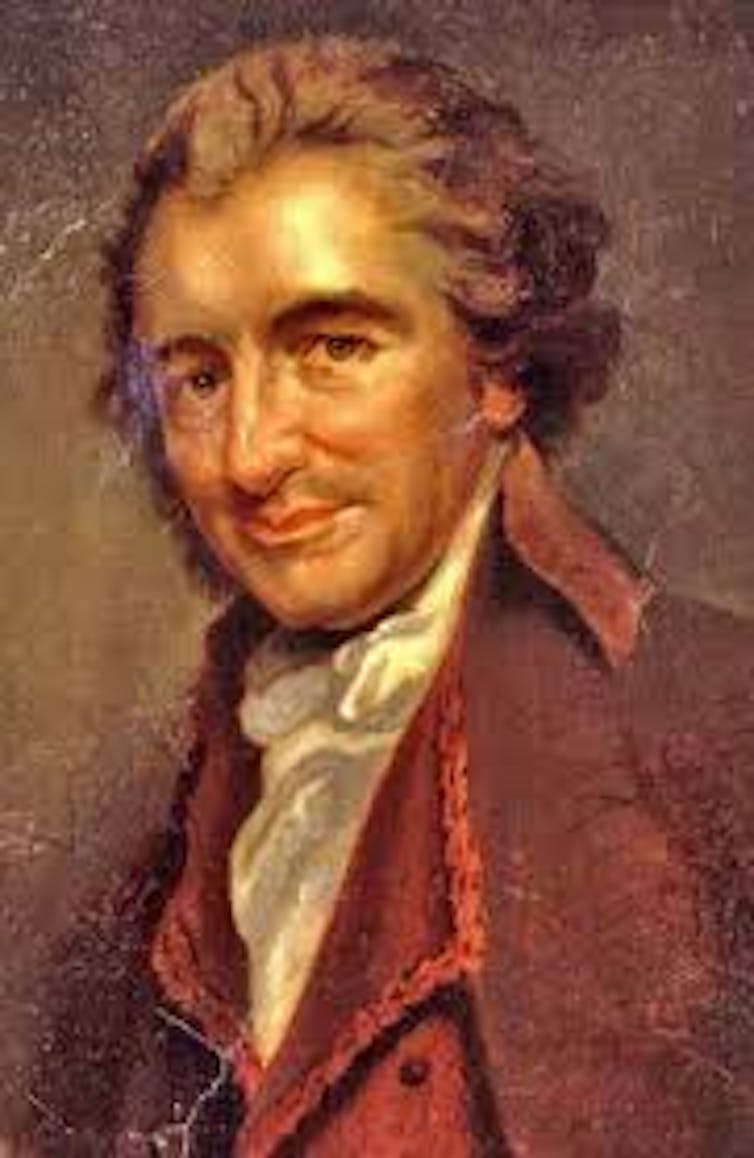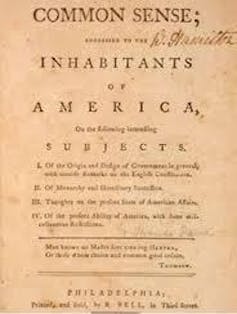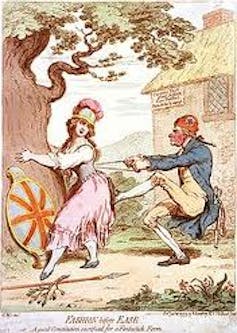Readers might like to sample the following birthday toast in honour of the English political writer Thomas Paine (1737 – 1809). It was prepared for a dinner hosted by Graham Allen MP, Chair of the Political and Constitutional Reform Select Committee, in the House of Commons, London, January 28th 2013.

Citizenesses and Citizens,
We gather tonight to celebrate the birth of Thomas Paine 276 years ago, in Thetford, on Saturday 29th January, 1737. Our dinner is not indulgence; it is a public act. It is a poignant reminder that memories of people’s lives need protection, and that because departed characters like Paine sometimes feel much more alive than the living, memorial gatherings are vital contributions to guarding the precious things of the past, a powerful way of publicly remembering them, in bodies present, and in words.
Paine’s close friend Thomas Jefferson liked to say that the dead have no rights, but that way of thinking belongs to a bygone era, to times when people believed the past was overcast with gloom, whereas the future would bring sunshine with roses. We are learning to be more circumspect. It is not only that there are no laws of human progress and that the future sometimes turns sour, as we know from the past century, the most violent and destructive in human history. We are coming to see that the dead, particularly those who have been bossed and bullied by their foes, as Paine was, have stories to tell, that they have rights, and that their lack is to be regretted, and resisted. We may ignore our ancestors, treat them as featherbrains, or worse, but legendary figures like Tom Paine - the literary lion who penned the three biggest-selling books of the eighteenth and early nineteenth centuries, a citizen extraordinary who still today excites public interest, even prompting President Obama to quote him in his first inaugural address - remind us that the dead are often very much with us, part of us, part of our future.

With luck and help from living friends, the dead can teach us to speak a new political language. They can instruct us in unorthodox ways of thinking, different feelings about life’s meaning; the dead can even suggest new ways of resolving current public problems, like very British parliamentary corruption scandals, the abuse of power by corporate journalists and the spread of poverty among young people and senior citizens. When the dead manage to teach us to think again, to act differently, as Paine did in style, they live on powerfully, into the present. They become living legends. They prove that the past is continuous; they show that yesterday is today, always present, an ingredient of the future.

Citizenesses and citizens: truly remarkable is the way Tom Paine, against mighty odds, managed to survive the revolutionary upheavals of the eighteenth and early nineteenth centuries. Paine was undoubtedly the greatest English champion of clean, open, humble government. And it has often been said that his life-long devotion to the cause of liberty for all; his brave and unshrinking advocacy of truth in politics; his deep-seated dislike of kingship and priestly tyranny, even his willingness to attack the hubris of the American and French revolutionaries…it is said that all of this guaranteed that he would be remembered on occasions such as our own. We should be less sure, for that view understates his scandalous treatment by his contemporaries: especially by political and religious bigots who dreamed of dangling him from a gibbet; or tried to nail him to the cross of public opinion; or chucked stones and cursed, as did the hostile crowd that puffed with anger at Dover, from where he was forced into exile, with an arrest warrant for seditious libel around his ears, thus ensuring that he would never return to his native England.
The rough injustice he suffered hammers home the point that legends are made, not born. Tradition never just happens; memory is far from automatic. The presence of the past is an achievement of the living. The dead cannot speak for themselves; they always need help from their latter-day friends. Tammy Paine’s foes were a motley bunch of wigged and powdered supporters of mentally ill King George III, Jacobin terroristes, boorish Christian sectarians in America, but they understood this point well. That is why they tried to damn and disappear him; to accuse him of seditious libel; to condemn him as a ‘filthy little atheist’ (Teddy Roosevelt), even to accuse him of bad grammar and confabulation (George Chalmers, his first biographer, howled that he added an ‘e’ to disguise his Norfolk upbringing).
The aim in every case was to push Paine into a rat’s alley, where not even his bones survived. His bones were indeed lost, as you know. But even though Paine found no final resting place, it was thanks to his friends that memories of his brilliant achievements survived, beginning with the first glimpse we have of him, a daunting epitaph for a pet crow, which he buried in the garden of his home on Bridgegate:
Here lies the body of John Crow, Who once was high but now is low; Ye brother Crows take warning all, For as you rise, so must you fall.
As you rise, so must you fall: with these words, written when he was just eight years old, the boy from Thetford signalled his life-long contempt for hubris and his deep dislike of grovelling; in an age of corrupting government oiled by sinecures, he was brave enough to call George III ‘king or Madjesty’, even to conclude a letter to the Home Secretary: ‘I am, Mr Dundas, Not your humble and obedient servant’. In snorting style, Paine satirised corruption caused by unaccountable power. He hurled his quill at the indignity of poverty, the pity of war, unrestrained markets and greedy banks. He did everything he could to prevent the abuse of citizens’ rights by governments. He disliked parochialism (‘where liberty is not, there is my country’, he reportedly told Benjamin Franklin); and he drew from the principle that the earth is common property the conclusion that the most vulnerable in society – especially the young and old – ought to be guaranteed as of right their fair share of its wealth.
Most compelling of all was Paine’s burning desire to meet the arguments of his foes, not with gunpowder or the sword, or haughty bitterness, but with words from Isaiah: ‘Let us reason the matter together’. It is at least arguable that both that command and its egalitarian sentiments are today badly needed in a Britain battered and bruised by deep economic and political recession and public disaffection with party politics. What is certain is that the spreading public debate about such matters as constitutional reform, European integration and social injustice must continue, even intensify, informed by the understanding that history matters, and that these are the times when the living speak freely of the dead, so granting them voices and votes. The connection between our celebration this evening and memory and politics should be made clear to all. Fond memories of Tom Paine must be kept green in our souls, according to the principle he so powerfully helped to fashion: democracy among the living demands democracy among the dead.
Wherever you are: Happy birthday, Thomas Paine!
The Democracy Field Notes series is available to Spanish readers
